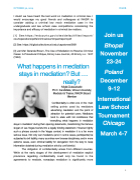OCTOBER 30, 2019 INADR I doubt we have heard the last word on mediation in criminal law. I would encourage my good friends and colleagues at INADR to consider adding a criminal law mock mediation case in the undergraduate and law school case competitions considering the importance and effiffifficacy of mediation in criminal law matters. [1] See:https://mdcourts.gov/sites/default/fifiles/import/ courtoperations/pdfs/criminalcourtimpactreport.pdf [2] See: https://digitalcollections.sit.edu/capstones/2681 [3] Jennifer Gerarda Brown, The Use of Mediation to Resolve Criminal Cases: A Procedural Critique, Emory Law Journal, 43 Emory L.J. 1247 (1994) What happens in mediation stays in mediation? But ......... really? Miglėė Zukauskaitėė Ph.D. Candidate, Vilnius University, Mediator & Trainer, INADR Board Member Confidentiality is often one of the main selling points used by mediators advertising mediation and the point of attraction for potential users. Mediators tend to state with full confidence that ‘everything what happens in mediation stays in mediation’ during their opening statements, transforming the famous slogan of Las Vegas tourists into a legally binding statement. However lightly such a phrase sounds in the Vegas context, in mediation it is a far more serious issue. Not only can mediators (and, in some cases, participants) be subjected to civil liability, many countries now foresee disciplinary, and in more extreme cases, even criminal liability for derogation from the duty to keep information obtained during mediation strictly confifidential. The obligation of confifidentiality arises from different sources. While at the early stages of the development of mediation explicit provisions regarding confifidentiality could only be found in the agreements to mediate, nowadays mediation is signifificantly more Join us Bhopal November 23-24 Poland December 9-12 International Law School Tournament Chicago March 4-7 4
